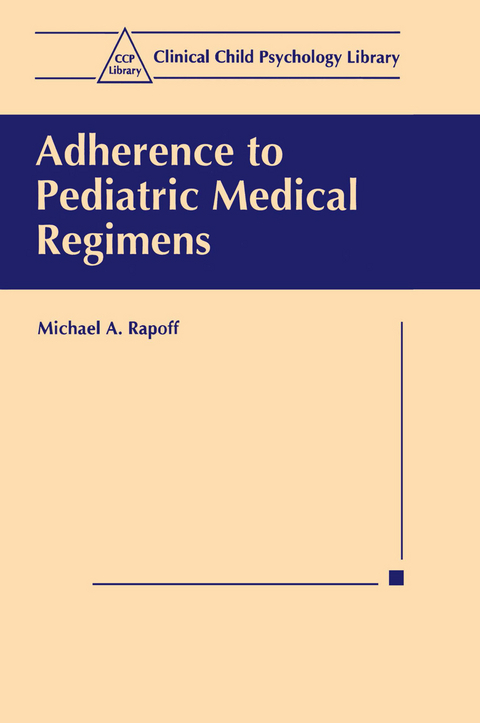
Adherence to Pediatric Medical Regimens
Seiten
1999
Kluwer Academic/Plenum Publishers (Verlag)
978-0-306-46083-8 (ISBN)
Kluwer Academic/Plenum Publishers (Verlag)
978-0-306-46083-8 (ISBN)
- Titel erscheint in neuer Auflage
- Artikel merken
Zu diesem Artikel existiert eine Nachauflage
Reviews the prevalence and serious consequences of poor adherence to medical regimens for children and adolescents. This text examines the nature of adherence problems, reasons for non-adherence, strategies for assessing and improving adherence to both acute and chronic disease regimens, and published research.
1. It is incumbent on medical providers that they are asking patients to - here to regimens with demonstrated eficacy, Providers need to remind themselves of the Hippocratic oath: "I will follow that system of regimen which, according to my ability and judgment, I consider for the benefit ofmy patients, and abstain from whatever is deleterious and mischievous" (as cited in Cassell, 199 1, p. 145). 2. Providers need to abandon the "blame and shame" approach to dealing with medical adherence problems. It is tempting to blame patients for adherence failures and shame them into changing their behavior. Providers need to share the blame (or better yet omit blame) and look at their own attitudes and behaviors that impact adherence. For example, failing to simplify regimens or minimize negative side effects can adversely impact patient adherence. 3. Patients and their families are no longer (or maybe were never) satisfied with apassive role in their health care. In fact, the tern compliance lost favor in the literature because it implied for some an authoritarian approach to health care that required unquestioned obedience by patients to provider recommendations (DiMatteo & DiNicola, 1982). Comprehensive and effective health care requires a cooperative relationship between providers and patients and their families. It also acknowledges the following realities, particularly for treating persons with chronic illness: "Doctors do not treat chronic illnesses. The chronically ill treat themselves with the help of their physicians; the physician is part of the treatment.
1. It is incumbent on medical providers that they are asking patients to - here to regimens with demonstrated eficacy, Providers need to remind themselves of the Hippocratic oath: "I will follow that system of regimen which, according to my ability and judgment, I consider for the benefit ofmy patients, and abstain from whatever is deleterious and mischievous" (as cited in Cassell, 199 1, p. 145). 2. Providers need to abandon the "blame and shame" approach to dealing with medical adherence problems. It is tempting to blame patients for adherence failures and shame them into changing their behavior. Providers need to share the blame (or better yet omit blame) and look at their own attitudes and behaviors that impact adherence. For example, failing to simplify regimens or minimize negative side effects can adversely impact patient adherence. 3. Patients and their families are no longer (or maybe were never) satisfied with apassive role in their health care. In fact, the tern compliance lost favor in the literature because it implied for some an authoritarian approach to health care that required unquestioned obedience by patients to provider recommendations (DiMatteo & DiNicola, 1982). Comprehensive and effective health care requires a cooperative relationship between providers and patients and their families. It also acknowledges the following realities, particularly for treating persons with chronic illness: "Doctors do not treat chronic illnesses. The chronically ill treat themselves with the help of their physicians; the physician is part of the treatment.
Medical Nonadherence Prevalence, Consequences, and Correlates.- Adherence Theories: Review, Critique, and Clinical Implications.- Assessing Adherence.- Assessing Disease and Health Status.- Strategies for Improving Adherence to Pediatric Medical Regimens.- Review of Adherence Intervention Studies and Recommendations for Research and Clinical Practice.
| Erscheint lt. Verlag | 28.2.1999 |
|---|---|
| Reihe/Serie | Clinical Child Psychology Library |
| Zusatzinfo | XVIII, 174 p. |
| Verlagsort | New York |
| Sprache | englisch |
| Maße | 152 x 229 mm |
| Themenwelt | Geisteswissenschaften ► Psychologie ► Entwicklungspsychologie |
| Geisteswissenschaften ► Psychologie ► Pädagogische Psychologie | |
| Medizin / Pharmazie ► Medizinische Fachgebiete ► Pädiatrie | |
| Medizin / Pharmazie ► Medizinische Fachgebiete ► Psychiatrie / Psychotherapie | |
| ISBN-10 | 0-306-46083-1 / 0306460831 |
| ISBN-13 | 978-0-306-46083-8 / 9780306460838 |
| Zustand | Neuware |
| Haben Sie eine Frage zum Produkt? |
Mehr entdecken
aus dem Bereich
aus dem Bereich
Vormals Oerter & Montada
Buch | Hardcover (2018)
Julius Beltz GmbH & Co. KG (Verlag)
64,00 €
Deutsche Auflage unter Mitarbeit von Sabina Pauen
Buch | Hardcover (2022)
Springer (Verlag)
59,99 €
praktische Hilfen für Kinder und Jugendliche im Autismus-Spektrum
Buch | Softcover (2023)
Kohlhammer (Verlag)
31,00 €



